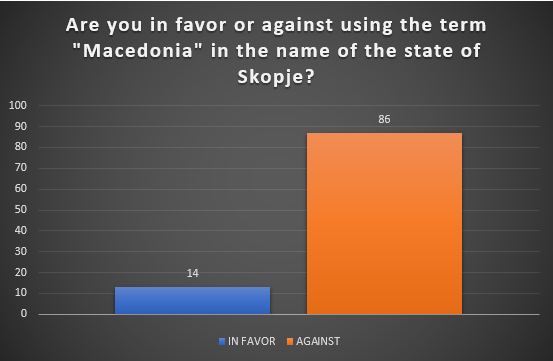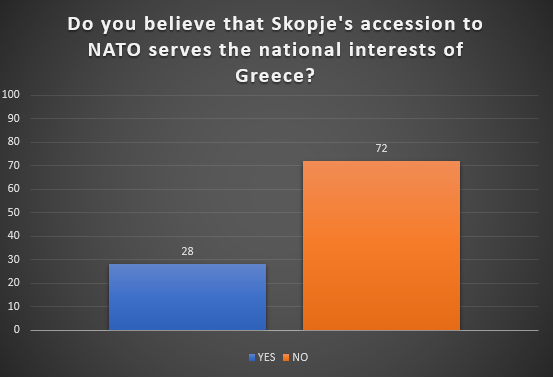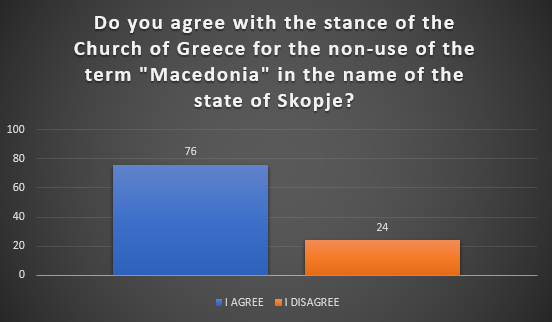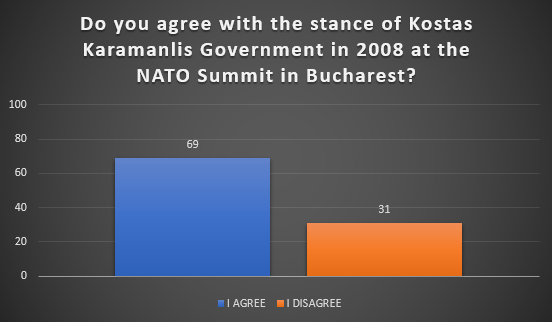The online public opinion survey conducted by KEDISA between 01/02/2018-15/02/2018 on the Skopje name dispute was completed on February 15, 2018. The results are interesting, not surprising though, as they are largely identified with the results of polls already seen in the light of publicity. Altogether more than 1000 people voted, so the sample is judged to be satisfactory. It is worth noting that the online poll had been set up so that every internet user who voted had the right to vote only once, excluding to re-vote and distort the final results.
The results of the poll are as follows:
1. Are you in favor or against using the term “Macedonia” in the name of the state of Skopje?
- In favor: 14% (141)
- Against: 86% (895)
2. Do you believe that Skopje’s accession to NATO serves the national interests of Greece?
- Yes: 28% (288)
- Nο: 72% (729)
3. Do you agree with the stance of the Church of Greece for the non-use of the term “Macedonia” in the name of the state of Skopje?
- I agree: 76% (780)
- I disagree: 24% (246)
4. Do you agree with the stance of Kostas Karamanlis Government in 2008 at the NATO Summit in Bucharest?
- I agree: 69% (690)
- I disagree: 31% (314)
The conclusions that come out of the poll according to our assessment are as follows:
a) The Greek public with an overwhelming majority is not ready to accept a solution using the term “Macedonia” for the name of the Skopje This attitude of Greek public opinion at first sight can lead to a deadlock in the negotiation for the solution of the name dispute with Skopje. At a second reading, it could assist the Greek government and point out to friends and allies in NATO and the EU that due to the hard attitude of the Greek people to this sensitive national issue, pressure will have to be put on major retreats in the Skopje side. If not to avoid the use of the term “Macedonia” in the name, at least in the explicit and complete renunciation with international guarantees of every irrational reference and use of the pseudo-ideology of “Macedonian”, “Macedonian identity” and “Macedonian language” of Skopje as well as in school books etc.
b) The Greek public opinion, too, far outpacing the electoral power of political parties traditionally opposed to NATO (e.g. the Greek Communist Party), does not seem to be convinced by the narrative of NATO and the EU that Skopje’s accession to NATO will ensure stability on the northern border of Greece and will therefore benefit Greece’s national interests. This is a finding that the Greek government should take seriously into consideration, especially in the event that Skopje’s accession to NATO under the provisional name FYROM should be put forward on the negotiating table.
c) Greek public opinion clearly supports the attitude of the Church of Greece for not using the term “Macedonia” in the name of the Skopje state, which proves that the institution of the Church continues to be respected and appreciated by the Greek people.
d) Greek public opinion also supports by a large majority the strong attitude that Kostas Karamanlis’s government held at the NATO summit in Bucharest in April 2008, essentially vetoing Macedonia’s accession to NATO without prior resolving the name dispute with the neighboring country. This attitude of the Karamanlis government is also a compass for the current Greek government at the next NATO Summit in Brussels in July 2018.





